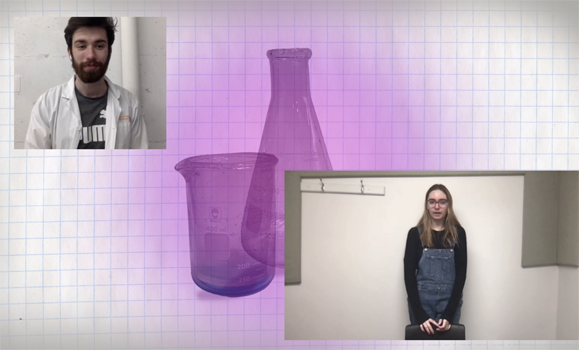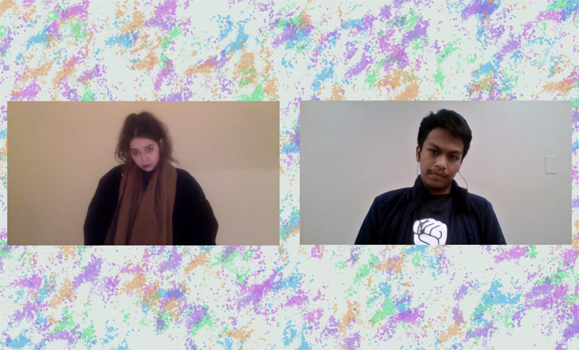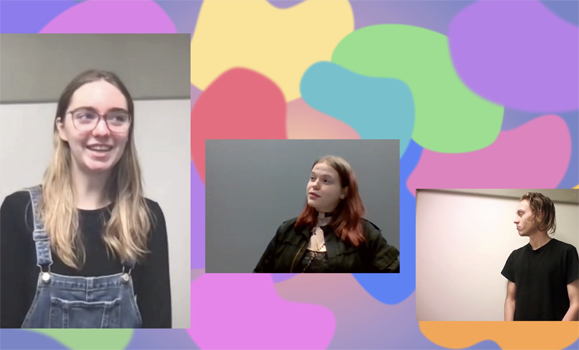With the December holiday break long over, COVID cases still high, and winter storms aplenty, itŌĆÖs easy to wonder just how to find joy among all gloom.
Luckily, the Fountain SchoolŌĆÖs third-year acting class is tackling exactly that question in their latest production, The Science of Joy.
The third play of DalTheatreŌĆÖs 2021-2022 season is from February 8 to 12 at 7:30 pm and February 12 at 2:00 pm.
Making it their own
The Science of Joy is a piece of devised theatre, which means that there was no pre-existing text when rehearsals started. Instead, the team began ŌĆ£with nothing except for a seed of an idea, and as an ensemble, [they did] various explorations, exercises, and experiments to build a show,ŌĆØ says director Richie Wilcox.
Devised shows provide actors with a unique opportunity to bring their whole selves to a production, instead of just embodying a predefined character. ŌĆ£The advantage of a devised show is that you really do get to share your own voice, talents and ideas,ŌĆØ says Wilcox. ŌĆ£ItŌĆÖs a true collaborative effort.ŌĆØ
Of course, bringing your own thoughts and ideas to a show can also be intimidating. Second-year student Emma Lamont says that part of her role as assistant stage manager was to be ŌĆ£a pillar of support for the team as they are creating, and to foster a safe and welcoming environment, [because] devising a show can be a very vulnerable process.ŌĆØ

Sam Cooper and Gaby Girard.
Searching for joy
The Science of Joy is a show about scientists who study the nature of joy and how to recreate it. When the ensemble was brainstorming themes, they were deeply influenced by the world around them.
ŌĆ£The pandemic has filled our lives with such anxiety, stress and grief, [so] we wanted to focus on something positive within this creation,ŌĆØ says Wilcox.
ŌĆ£Obviously the theme of joy and how we find it is the biggest theme in the show. But what is interesting within that are the commonalities in how everyone feels joy in a physical sense. And also, the overlap of where people find it in their lives is also surprisingly common and everyday. Many people list quite commonplace and ordinary things as their source of joy.ŌĆØ
The ensemble used different exercises to create their production. The most fruitful of their experiments was documentary theatre. According to Wilcox, the cast ŌĆ£did a variety of interviews to provide the source material and content for a large majority of the piece.ŌĆØ Once these interviews were assembled, ŌĆ£the writing of the script then became transcribing and editing interviews, overlapping and intersplicing them, and more to create original scenes.ŌĆØ
The result of this process is two different scripts that work as ŌĆ£a collection of shorts scenes and choral work about happiness, human nature, and the pursuit of joy.ŌĆØ

Rhys Parks and Neo Ragsac.
Expect the unexpected
Focusing on joy motivated the cast and crew as they dealt with a number of unforeseen challenges.
In previous years, DalTheatre has introduced restrictions on devised productions to help inspire creativity, like limiting the number of props actors could use or banning the use of green screens. This time, the limitations came from the outside world rather than from the Fountain School.
Although previous productions this season were performed on stage in front of an audience, elevated case counts and added provincial restrictions meant that the devised show was moved online fairly late into the process. This shift to virtual created new constraints for the ensemble.
ŌĆ£An online version instantly gives you limitations in what you're working with, especially within the visual aspect but also within the relational aspect for the actors,ŌĆØ Wilcox explains.╠² ŌĆ£The scene partner for each actor now becomes a screen: an inanimate object which doesn't give you any energy to feed off of. It's a real challenge for each actor as they have to perform without getting feedback from an audience or scene partner.ŌĆØ
Additionally, snowstorms led to cancelled rehearsal days. And in a stroke of especially bad luck, Wilcox himself contracted COVID during the rehearsal process. Yet, through all of it, the team kept going.
ŌĆ£It has been a rollercoaster of a process,ŌĆØ says Wilcox, ŌĆ£and I am so impressed at how the students involved in this production are persevering and really rising to the occasion despite all those setbacks.ŌĆØ

╠²

